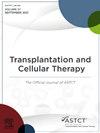Allogeneic Hematopoietic Stem Cell Transplantation in Puerto Rico
IF 3.6
3区 医学
Q2 HEMATOLOGY
引用次数: 0
Abstract
The blood and marrow transplantation program at Hospital Auxilio Mutuo (HAM) in San Juan, Puerto Rico (PR) was founded on May 2015. On February 2017, the first allogeneic hematopoietic stem cell transplant (allo-HSCT) was done. Prior to this date the only option for patients from PR in need for allo-HSCT was to travel to a center in the United States (US). However, most patients faced multiple barriers to achieve this goal, including economic status, and socio-economic support. Most patient from PR had no access to allo-HSCT and faced life-threatening disease.
Data from patients undergoing allo-HSCT from February 2017 to December 2023 was collected and retrospective analysis done. A total 119 allo-HSCT were performed. The median age for allo-HSCT was 43 years, with youngest patient having 17 years and oldest having 70 years. Sex distribution was 54% females and 46% males. Most patients were part of public health system (47%).
The most frequent diagnosis among allo-HSCT was acute myelogenous leukemia (AML, 33%) followed by acute lymphoblastic leukemia (ALL, 18%), myelodysplastic syndrome (MDS, 16%), non-Hodgkin's lymphoma (NHL, 12%), severe aplastic anemia (SAA, 11%), and Hodgkin's lymphoma (7%).
Donor source was 42% match related, 57% haploidentical and 1% match unrelated. Conditioning regimen was reduced intensity (RIC) in 54% and myeloablative (MAC) in 46% of cases. The median age for MAC was 40 years and for RIC was 46 years. Most common diseases treated with RIC were SAA (20.3%), AML (20.3%), and NHL (18.3%). Most common diseases treated with MAC were AML (47.3%), ALL (29.1%) and MDS (16.4%). Overall survival (OS) at 30-days, 100-days and 1-year post-transplant was 91%, 83% and 65% respectively for allo-HSCT. Two-year OS by type of donor was 57.4% for matched related and 59.7% for haploidentical. Incidence of acute graft-versus-host disease in 2023 was 39.2%.
Existing literature suggests that studies on allo-HSCT are often not representative of the broader patient population, with a lack of diversity in terms of racial/ethnic background. This raises concerns about the applicability of research findings to diverse populations, such as the unique demographic and socio-economic profile of PR. Since February 2017, PR have access to allo-HSCT locally with the same standards and quality medical care of centers in US. The probability to find a MUD is lower for a patient from PR because of ethnical biodiversity. For this reason, haploidentical donors became a convenient and practical option for patients from PR in need of allo-HSCT. In 2023 HAM in collaboration with TCT Oncology started reporting data of allo-HSCT and autologous-HSCT performed in PR to the Center for International Blood & Marrow Transplant Research (CIBMTR). Hispanic patients from PR are now represented in these database. This effort will help support research and improve patient outcomes. Our goal is obtaining FACT accreditation by 2025.
波多黎各的异基因造血干细胞移植
2015年5月,波多黎各圣胡安Auxilio Mutuo医院(HAM)成立了血液和骨髓移植项目。2017年2月,首例同种异体造血干细胞移植(allo-HSCT)完成。在此之前,需要进行同种异体造血干细胞移植的PR患者的唯一选择是前往美国的中心。然而,大多数患者在实现这一目标时面临多重障碍,包括经济地位和社会经济支持。大多数来自PR的患者无法获得同种异体造血干细胞移植,并且面临威胁生命的疾病。收集2017年2月至2023年12月接受同种异体造血干细胞移植患者的数据并进行回顾性分析。共进行了119例allot - hsct。同种异体移植患者的中位年龄为43岁,其中最年轻的患者为17岁,最年长的患者为70岁。性别分布为女性54%,男性46%。大多数患者是公共卫生系统的一部分(47%)。同种异体造血干细胞移植中最常见的诊断是急性髓性白血病(AML, 33%),其次是急性淋巴细胞白血病(ALL, 18%)、骨髓增生异常综合征(MDS, 16%)、非霍奇金淋巴瘤(NHL, 12%)、严重再生障碍性贫血(SAA, 11%)和霍奇金淋巴瘤(7%)。供体来源42%为配型相关,57%为单倍体相同,1%为配型无关。调节方案降低了54%的强度(RIC)和46%的清髓(MAC)。MAC的中位年龄为40岁,RIC的中位年龄为46岁。RIC治疗的最常见疾病是SAA(20.3%)、AML(20.3%)和NHL(18.3%)。MAC治疗最常见的疾病是AML(47.3%)、ALL(29.1%)和MDS(16.4%)。移植后30天、100天和1年的总生存率(OS)分别为91%、83%和65%。按供体类型划分,配型亲属的2年生存率为57.4%,单倍同卵者为59.7%。2023年急性移植物抗宿主病的发病率为39.2%。现有文献表明,同种异体造血干细胞移植的研究往往不能代表更广泛的患者群体,在种族/民族背景方面缺乏多样性。这引起了人们对研究结果在不同人群中的适用性的担忧,例如PR的独特人口统计学和社会经济概况。自2017年2月以来,PR可以在当地获得与美国中心相同的标准和高质量的医疗服务。由于种族多样性,PR患者发现MUD的可能性较低。因此,对于需要同种异体造血干细胞移植的PR患者来说,单倍体捐赠者成为一种方便而实用的选择。2023年,HAM与TCT肿瘤学合作,开始向国际血液中心报告在PR进行的同种异体造血干细胞移植和自体造血干细胞移植的数据;骨髓移植研究(CIBMTR)。来自PR的西班牙裔患者现在在这个数据库中有代表。这一努力将有助于支持研究并改善患者的治疗效果。我们的目标是到2025年获得FACT认证。
本文章由计算机程序翻译,如有差异,请以英文原文为准。
求助全文
约1分钟内获得全文
求助全文
来源期刊

Transplantation and Cellular Therapy
Medicine-Hematology
CiteScore
7.00
自引率
15.60%
发文量
1061
审稿时长
51 days
 求助内容:
求助内容: 应助结果提醒方式:
应助结果提醒方式:


